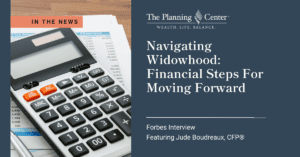Thinking clearly about money is challenging. Acting in alignment with your goals about money is also challenging. Most of us want to be good stewards of our money and make smart money decisions, yet most of can fall prey to five common money mistakes:
- Loss aversion
- Confirmation bias
- Herd mentality
- Choice paralysis
- Anchoring
Loss Aversion
If your retirement portfolio increases by $20,000, you probably feel pretty happy. But if your retirement portfolio decreases by $20,000, you experience this loss a lot more emotionally. Why? Because it is part of our nature as humans to protect what we have—particularly our money or other assets.
Most people, including you, suffer from this bias. We are hard-wired as humans to react more intensely to a loss than a gain of the same magnitude. Knowing how our brains work we can better manage our emotional response and look at the situation more objectively.
Confirmation Bias
We like to know that we are right. It feels affirming to be around people who think and feel like we do. Imagine that your investment portfolio is decreasing along with the overall market and this makes you feel uncomfortable. What should you do?
If you fall prey to confirmation bias, you may choose to read only the information that fits with your thoughts and opinions—and ignore information that could otherwise prove useful in making an informed decision.
To minimize confirmation bias, remember that informed decision-making is comprehensive and includes information that fits with your pre-existing beliefs and, more importantly, information that contradicts your pre-existing beliefs. In short, seek contrary evidence to be an informed decision maker.
Herd Mentality
Most of us are social beings. Consider the cliché of “keeping up with the Joneses” when choosing which house or car to buy. It captures the essence of the herd mentality. We are designed to seek safety by being part of the group rather than being alone. This tendency to join the herd often happens when we make financial decisions.
Imagine if your family, friends, or co-workers are buying gold because they are nervous about the stock market, then it is likely that you will buy gold too. Who wants to feel left out? This tendency makes sense emotionally because it increases your sense of belonging. Nevertheless, the herd is often wrong. Dead wrong.
To prevent or minimize herd mentality, be a contrarian after you have comprehensively examines the situation with objective data and your own common sense. If you find it difficult to stand out among the crowd, then seek out individuals who are contrarian and consider their reasoning.
Choice Paralysis
Choice generates feeling of independence and control. Yet, social scientists know that too many choices lead us to feel overwhelmed. Having too many options paralyzes us. Picture yourself in the Baskin Robbins Ice Cream store. The clerk asks, “How can I help you?” You pause and wonder whether you want ice cream or yogurt, which one of 31+ flavors, a small or a large, plain or with some topping, in a cone or a cup, and whether you will pay with cash or credit card.
All of these decisions are necessary just to buy ice cream. Imagine making a decision about which mutual fund or ETF to buy. It has been said that there are more mutual funds than companies.
To prevent or minimize choice paralysis, write down your goals. Remember how useful it can be to prepare a list of wants versus needs. Next, identify the criteria by which you will make the decision. With your goals in mind and relying upon the written criteria, weigh your options and make a decision. All decisions involve some level of risk, but making informed decisions minimizes risk. The good news is that some decisions are reversible and many decisions are low impact.
Anchoring
Anchors keeps ships from moving. In behavioral finance, anchoring represents the point at which we evaluate how well things are going. For instance, let’s assume you bought your house 15 years ago for $500,000. After the financial crisis in 2008/2009, your house dropped in value to $200,000. Today, your house is appraised at $450,000. You are considering selling your house, but will the sale represent a loss ($500,000-$450,000 = -$50,000) or a gain ($450,000 – $200,000 = +$250,000? It depends on where you drop your anchor.
To prevent or minimize anchoring when making decisions, entertain new information such as changes in home values and embrace flexibility. It is critical, although difficult, to accept the reality that some things may never go back to their original state or value.
Conclusion
These five common money mistakes are just a natural part of our human decision making process. By understanding our financial behaviors, we can reduce the mistakes that can happen when making important career, investment, housing, and retirement decisions. While you cannot always control the outcomes of your decisions, you can control the process by which you make a decision. Commit to making better money decisions today.
This article was reprinted at Forbes.com on April 14, 2017.
Marty Martin, PsyD, is a Psychologist in the Chicago office of The Planning Center, a fee-only financial planning and wealth management firm.
Email him at: info@theplanningcenter.com.








